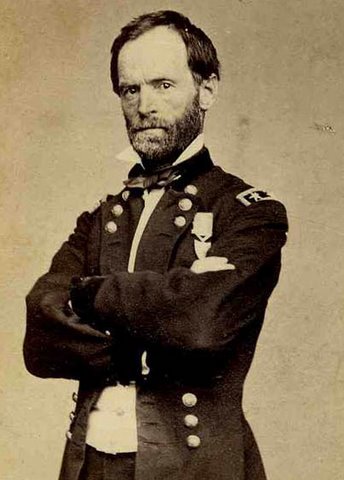
Major General William Tecumseh Sherman
February 8, 1820, Lancaster, Ohio
Died:
February 14, 1891, in New York, and was buried in Calvary Cemetery, St. Louis. His friend, Joseph Eggleston Johnston, was among those present at his funeral.
Childhood and Rearing:
- Father, Charles Robert Sherman died when he was 9 years old, and was raised by Senator Thomas Ewing of Ohio. One of 11 children.
- Mother, Mary Hoyt of Connecticut
- Baptized by a Presbyterian Minister, but never really attended church regularly
Brothers:
- Charles Sherman, became a Federal judge
- John Sherman, became a US Senator
- Hoyt Sherman became a successful banker
Wife:
- Eleanor Boyle “Ellen Ewing”, daughter of Thomas Ewing, First Secretary of the Interior. She was a devout Catholic.
- Married for 38 years
Children:
- Maria (Minnie) Ewing Sherman b: 1851
- Mary (Lizzie) Elizabeth Sherman b: 1852
- William (Willie) Ewing Sherman b: 1854 d: 1863
- Thomas (Tom) Ewing Sherman b: 1856 In 1878 he became a Catholic
priest. He presided over his father’s 1891 funeral. - Eleanor (Ellie) Mary Sherman b: 1859
- Rachel Ewing Sherman b: 1861
- Charles Celestine Sherman b: 1864 d: 1864 at age 6 months
- Philemon Tecumseh (Cump) Sherman b: 1867 – never married
Education:
- Graduated from West Point Military Academy and was 6th in his class out of 42 students,
the Class of 1840. His roommate was George Thomas, who would later serve with him in the Chickamauga Campaigns.
Career:
- Lieutenant assigned to the United States Artillery and was stationed at Fort Moultrie in Charleston, South Carolina.
- He resigned from the military in 1853 as a Captain in the commissary
- He moved to California and Kansas, and went to work in banking and law, but failed.
- In 1859, he was nominated by Braxton Bragg and P.G.T. Beauregard to become the first superintendent of Louisiana State Seminary and Military Academy (now LSU) at Alexandria, Louisiana. After the war, the school moved to Baton Rouge, Louisiana and became Louisiana State University., The motto of the seminary was “By the liberality of the General Government of the United States, the Union – esto perpetua”, yet, debate of secession from the Union was rampant throughout the state. Sherman did not approve of slavery, specifically the splitting up of African American families, but he was much more interested in maintaining the preservation of the Union.
- On January 18, 1861, Sherman resigned his position stating that he preferred to maintain his allegiance to the Constitution as long as a fragment of it survived. On February 25th, Sherman left Louisiana and returned to Ohio. He remained in Lancaster for a month and then moved his family to St. Louis, Missouri where he was elected President of the Fifth Street Railroad.
- Colonel, 13th United States Infantry (May 14, 1861); commanding 3rd Brigade (13th New York, 69th New York, 79th New York, 2nd Wisconsin, Co. E, 3rd U.S. Artillery), 1st Division, Army of Northeastern Virginia June-August 17, 1861, Battle of Manassas/Bull Run, Virginia
On May 8, 1861, Sherman wrote to the Secretary of War, offering his services not for three months, but for three years. He did not want to become a political general and on June 20, 1861 accepted the rank of Colonel in the Thirteenth US Regular Infantry. He assumed command of a brigade in the First Division of McDowell’s army under the command of Brigadier-General Daniel Tyler. His brigade, stationed at a stone bridge during the Battle of First Manassas (Bull Run), was routed by devastating Confederate cannon fire.
- Brigadier General, United States Volunteers (August 7, 1861, to rank from May 17); commanding brigade, Division of the Potomac (August 17-28, 1861)
- Second-in-Command, Department of the Cumberland (August 28 – October 8, 1861); commanding the department (October 8 – November 9, 1861); commanding District of Cairo, Department of the Missouri (February 14 – March 1, 1862); commanding 5th Division, Army of the Tennessee (March 1 – July 21, 1862)
- Major General, United States Volunteers (May 1, 1862); commanding 5th Division, District of Memphis, Army of the Tennessee July 21 – September 24, 1862); commanding lst Division, District of Memphis, Army of the Tennessee (September 24-October 26, 1862); also commanding the district July 21 – October 26, 1862); commanding District of Memphis, 13th Corps, Army of the Tennessee (October 24 – November 25, 1862); commanding Yazoo Expedition, Army of the Tennessee (December 18, 1862 January 4, 1863); commanding 2nd Corps, Army of the Mississippi January 4-12, 1863); commanding 15th Corps, Army of the Tennessee January 12 – October 29, 1863)
- While traveling to Chattanooga, General Sherman departed Memphis on a train that arrived at the Battle of Collierville, Tenn., while the Union garrison there was under attack on October 11, 1863. General Sherman took command of the 550 men and successfully defended against an attack of 3,500 Confederate cavalry.
- Brigadier General, United States Army July 4, 1863); commanding Army and Department of the Tennessee (October 24, 1863 – March 26, 1864)
- Major General, United States Army (August 12, 1864); Commanding Military Division of the Mississippi (March 18, 1864 – June 27, 1865.
- August 12, 1864, he was promoted to Major General of the Regular United States Army and left his volunteer status.
- Lieutenant General, United States Army July 25, 1866)
After the war, Sherman’s military career continued as the commander of the Division of the Mississippi; was the military assistant regarding the construction of the transcontinental railroad; and commanded campaigns against hostile Indians. On July 25, 1866, upon Grant being promoted to full general, Sherman was promoted to lieutenant general and assigned to Washington, D.C. Here he took over temporary command of the army. When Grant was elected president, and upon his inauguration, Sherman was promoted to full general and general-in-chief, replacing Grant.
- General, United States Army (March 4, 1869)
- Commander-in-Chief, United States Army (March 8, 1869-November 1, 1883)
During this period he was responsible for the activities dealing with the American Indians in the West. Under his command, General George Armstrong Custer was defeated by the Sioux Indian Nation at the Battle of Little Big Horn, Montana.
- Sherman retired from the United States Army on November 1, 1883. Three years later, he became a resident in New York City. Sherman wrote his memoirs entitled: The Memoirs of William T. Sherman. His work consisted of a two-volume set that was published in 1875.
- William T. Sherman died in New York City on Valentine’s Day (February 14), 1891, and was buried in Calvary Cemetery in St. Louis, Missouri.
Campaigns & Battles
1861
- Battle of First Bull Run, Virginia
1862
- Battle of Donelson, Tennessee
- Battle of Fort Henry, Tennessee
- Battle of Shiloh, Tennessee
1863
- Battle of Chickasaw Bayou, Mississippi
- Battle of Vicksburg, Mississippi
- Battle of Chickamauga, Tennessee
1864
- Battle of Dalton, Georgia
- Battle of Resaca, Georgia
- Battle of Adairsville, Georgia
- Battle of New Hope Church, Georgia
- Battle of Dallas, Georgia
- Battle of Picket’s Mill, Georgia
- Battle of Kolb Farm, Georgia
- Battle of Kennesaw Mountain, Georgia
- Battle Peachtree Creek, Georgia
- Battle of Atlanta, Georgia
- Battle of Jonesboro, Georgia
- Battle of Love Joy Station, Georgia
- Battle of Griswoldville, Georgia
- Battle of Fort McAllister, Richmond Hill, Georgia
- Capture of Savannah, Georgia
1865
- Battle of River’s Bridge, South Carolina
- Battle of Averasboro, North Carolina
- Battle of Bentonville, North Carolina
- Battle of Morrisville Station, North Carolina
- Bennett Place, North Carolina
- He was the only Union general who twice received the Thanks of the United States Congress for his success in the Chattanooga and Atlanta Campaigns.
Quotes from Sherman:
- Sherman on Slavery in Louisiana, 1860 ”The people of Louisiana were hardly responsible for slavery, as they had inherited it; I found two distinct conditions of slavery, domestic and field hands. The domestic slaves, employed by the families, were probably better treated than any slaves on earth; but the condition of the field-hands was different, depending more on the temper and disposition of their masters and overseers than were those employed about the house. Were I a citizen of Louisiana, and a member of the Legislature, I would deem it wise to bring the legal condition of the slaves more near the status of human beings under all Christian and civilized governments. In the first place, in sales of slaves made by the State, I would forbid the separation of families, letting the father, mother, and children, be sold together to one person, instead of each to the highest bidder. And, again, I would advise the repeal of the statute which enacted a severe penalty for even the owner to teach his slave to read and write, because that actually qualified property and took away a part of its value.”
- “War is cruelty, and you cannot refine it. The crueler it is, the sooner it will be over.”
- “I tell you, War is Hell!”
- “Hold the fort! I am coming!”
- “My aim, then, was to whip the rebels, to humble their pride, to follow them to their inmost recesses, and make them fear and dread us. Fear is the beginning of wisdom. “
- “We cannot change the hearts and minds of those people of the South, but we can make war so terrible … [and] make them so sick of war that generations would pass away before they would again appeal to it.”
- “I think I understand what military fame is; to be killed on the field of battle and have your name misspelled in the newspapers.”
- “I hate newspapermen. They come into camp and pick up their camp rumors and print them as facts. I regard them as spies, which, in truth, they are. If I killed them all there would be news from Hell before breakfast.”
- “…We are not only fighting hostile armies, but a hostile people, and must make old and young, rich and poor, feel the hard hand of war, as well as their organized armies. I know that this recent movement of mine through Georgia has had a wonderful effect in this respect. Thousands who had been deceived by their lying newspapers to believe that we were being whipped all the time now realize the truth, and have no appetite for a repetition of the same experience… “
- “Many and many a person in Georgia asked me why we did not go to South Carolina; and, when I answered that we were en route for that State, the invariable reply was, “Well, if you will make those people feel the utmost severities of war, we will pardon you for your desolation of Georgia.”
- William T. Sherman, in a letter to Major-General H. W. Halleck, Chief-of-Staff, Washington, D.C., December 24, 1864
- “He stood by me when I was crazy and I stood by him when he was drunk; and now sir, we stand by each other.” — William T. Sherman on his relationship with Gen. Grant, post-war interview
- “Put ‘Faithful and Honorable; faithful and honorable!”
- (William T. Sherman, 1891, in response to his daughter when, on his deathbed, she asked him about the inscription he wished to have on his monument.)





